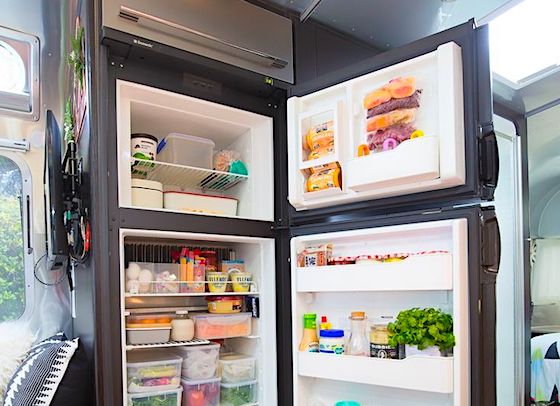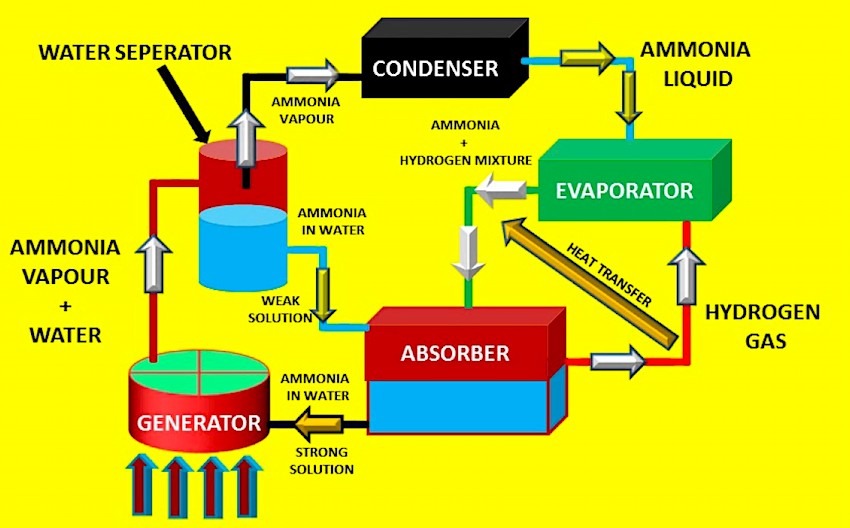Thanks for your support! If you make a purchase using our links in this article, we may make a commission. And, as an Amazon Associate, I earn from qualifying purchases. See the full disclosure here.
Updated April 27, 2024
Recently I was faced with the reality of needing to buy a new fridge for my RV. And, when I was researching RV fridges I came across a something called a 3-way RV refrigerator.
So what is a 3-way RV refrigerator? A 3 way RV refrigerator is a cold storage unit powered using three different energy sources. Depending upon your needs, you can run the fridge off propane, battery, or AC (shore or generator) power.
As I considered my options for replacing my RV refrigerator I learned that a 3-way fridge might be an excellent choice. Especially since we are planning to do quite a bit of off-grid boondocking.
So, read on to learn the following about 3 way RV refrigerators:
- How a 3 Way Fridge Works (this part gets a little technical so skip over it if you don’t geek out on this stuff)
- Benefits of a 3 Way RV Refrigerator
- 3 Way vs 2 Way RV Refrigerators
- Can You Convert a 2 Way Fridge to a 3 Way Fridge?
- Which 3 Way Fridges Should You Consider Buying?
- Can You Put A Residential Fridge In An RV?
- How Does a 3-Way RV Fridge Work?
- Benefits of 3 Way RV Fridges
- 3 Way RV Fridges vs. 2 Way RV Fridges
- Can I Convert a 2 Way RV Fridge into a 3 Way RV Refrigerator?
- Which 3-Way RV Refrigerator Should I Buy?
- Final Words About 3-Way RV Fridges
- Related Reading:
- Mike Scarpignato – Bio
Can You Put A Residential Fridge In An RV?
Residential fridges are often larger than RV fridges and offer more different styles. For these reasons many people think about swapping their RV fridge for a residential unit.
This certainly can be done if you have the room to make the switch. A residential fridge simply has to be plugged in to operate.
There are a few things to consider, however, before making the change. RV refrigerators are designed for bumps and bangs that come with RV travel. Residential units may not hold up as well.
Another feature of RV fridges is their ability to operate on propane and/or 12-volt DC battery power. With a residential fridge, you are limited to shore power so operation while underway may not be possible without upgrades.
How Does a 3-Way RV Fridge Work?
Different from a compressor, a 3-way refrigerator does not cool the system, but instead, extracts the heat. Otherwise known as absorption technology, there is a transfer of gas and energy in the back of the unit.
Absorption Cooling Cycle
The cooling cycle works in a three-step process using ammonia as the refrigerant. Water and hydrogen gas cycle this ammonia continuously to keep the system operating.
In the first stage, otherwise known as evaporation, there is a low partial pressure, which causes liquid refrigerant, or ammonia, to evaporate. When this happens, the removal of heat from the fridge occurs.
During the absorption phase, the gaseous refrigerant becomes another liquid after it is absorbed. This process reduces its partial pressure so that more fluid can evaporate.
In the final step, called regeneration, heating of the liquid ammonia occurs, which causes the refrigerant to evaporate. The vapor is condensed in a heat exchanger to replenish fluid in the evaporator.
Five Components to a 3 Way Fridge
The refrigerator consists of five different parts that each play a vital role in the proper functioning of the 3 way RV refrigerator.
The cycle begins in the evaporator, where room temperature, liquified ammonia enters the chamber and becomes mixed with hydrogen. The partial pressure of the hydrogen manipulates the total force, which changes the vapor pressure. The boiling point of ammonia is then lowered, causing it to evaporate, thus removing heat from the evaporator.
It is in the absorber that the water absorbs ammonia gas. This process begins when gasses flow into upward, twisting pipes until they reach water at the top. When the ammonia combines with the water, it creates an ammonia-water mixture and hydrogen solution. The two are separated in the absorber, as the hydrogen moves to the top and the ammonia gathers at the bottom.
The generator heats the ammonia and water mix to extract the ammonia. The removal of remaining water vapor and bubbles occurs in the next step.
The separator consists of winding, uphill tubes to pop the bubbles and rid excess water molecules, which isolates the ammonia. Now the vapor is completely separated from the water.
Lastly, the condenser, also known as the heat exchanger, takes this hot ammonia gas and changes it into liquid ammonia through a cooling and condensing process. The cycle then begins all over again.
Benefits of 3 Way RV Fridges
If you’re looking for an all-purpose and convenient product, a 3 way RV refrigerator is the best option. These fridges can run off gas power (LPG), 12V energy from a battery (DC) or solar system, and 110V electricity (AC).
With these options, you’ll never have to go without a cooling unit again. Whether you’re driving, hooked up to a site, or boondocking, your refrigerator will undoubtedly keep your food cold.
These 3-way fridges are beneficial for many more reasons.
Eliminates Stress About Refilling Propane
Propane is the most efficient and effective powering method, especially if you’re trying to avoid stopping at hookups. For example, one 9kg bottle of gas will run the fridge for about 2-3 weeks. This longer span allows you to adventure as far as you want without worrying about food.
Uses Shore or Generator Power When Accessible
If you enjoy traveling from site to site or prefer to remain stationary, the fridge will run off 110V. This feature allows you to cut down on propane and battery by occasionally using a hookup.
Operates Using Battery Power When Driving
Unfortunately, you cannot use gas or mains power while driving; however, you can use a 12V battery from the RV or vehicle.
Silent Operating System
Standard fridges use compressors, which can be noisy and disruptive. A 3 way RV refrigerator, on the other hand, uses absorption technology. This system uses mainly fluids and gas, meaning it is quieter than most.
Less Maintenance
These systems are dependable and do not typically need routine care.
Lasts Longer Than Other Types of RV Refrigerators
Compressors and 2-way fridges are more likely to need repairs and replacements sooner than a 3-way RV refrigerator. These types are more durable as they have fewer parts and mechanisms.
3 Way RV Fridges vs. 2 Way RV Fridges
A 3-way RV refrigerator and a 2-way RV refrigerator are similar in respect to their gas-powered operating systems and ability to plug into a 110V energy supply. These features allow for either campground stays or traveling off-grid.
The primary difference between both is that a 3-way unit will remain running on battery power while driving, whereas the 2-way model will not.
Be aware that the 12V battery does not work as well as gas or main electricity; however, it will keep a previously cold fridge at temperature. For these reasons, it is not favorable to use a battery as a primary energy source. Before switching to this method, be sure to cool down the system first by using gas or AC.
With either of these refrigerators, be wary about using propane while driving. Although rare, it is possible for the system to catch fire; therefore, using a battery is much safer when traveling. It is much more beneficial to purchase a 3-way RV refrigerator instead to lower this risk. Additionally, this unit does not contain combustible chemicals reducing the likelihood of fire or explosion.
Three-way power RV refrigerators are also much more compact. Propping it at an angle up to 30° is no issue, plus its design keeps food crisp while using less energy in the process.
Two-way fridges still have their advantages. Without a battery, there is no worry about depleting its charge or coming back to a dead vehicle or RV. They also come in larger sizes, as their mechanism is a tad different.
Making the right choice is a priority, as each has individual features that make it unique. No matter which fridge you buy, you will need it to be level for it to work properly. Check out my article called Leveling Your RV Fridge which is featured in RV Trader for more info.
Can I Convert a 2 Way RV Fridge into a 3 Way RV Refrigerator?
For all of you DIY RVers out there a 2 way RV fridge can indeed be converted into a 3 way RV refrigerator.
Adding a dedicated inverter behind the fridge, adjusting the wiring, and putting in switches will power the fridge on 110V AC. Note that the proper sizing of the battery bank is a must.
Even though this seems rather straightforward, the DIY installation can be a chore. The system will also use much more energy, as it will be running off both an inverter and a battery.
It is better cost-wise to purchase a 3-way fridge and only use the battery when driving. If this is not feasible, make your refrigerator as cold as you can before leaving and avoid opening it during the trip. Immediately plug into a power source when you arrive or turn on the propane after stopping.
Although possible, it will likely cost more money and cause heftier issues. Purchasing a 3-way refrigerator alleviates a majority of this stress making it an outstanding option.
Which 3-Way RV Refrigerator Should I Buy?
With various refrigerator brands to choose from, it can be tough to decide which to purchase. Selecting a dependable company makes all the difference, as reliable products are likely to save time and money down the road.
Dometic 3-way RV refrigerators are very trustworthy, as they were the first to produce mobile refrigeration products. Dometic sells millions of its products due to its unique features. If you’re looking for refrigerators with an automatic locking system, adjustable racking, and modifiable shelf guards, peruse through this company’s product line.
Norcold is another top company that produces high-quality 3-way fridges. They offer many great features, such as stabilization during bumpy rides, automatic frost limiting, locking door handles, and ultra-thin yet reliable insulation.
Spending more money may seem like a drag at first, but purchasing higher-quality appliances is the most logical choice. These products are likely to last longer and have fewer repairs.
RELATED READING: Check out our article called Should You Consider a Composting Toilet for Your RV? especially if you are considering boondocking!
Final Words About 3-Way RV Fridges
A 3-way RV refrigerator is best for those looking for a versatile unit that they can use in any situation. RVers looking to boondock or avoid campsites for extended periods should consider purchasing this type of fridge.
Keeping your food cold is a critical component when camping, as it is often difficult to consume a balanced diet on only non-perishables.
Meals that are not well-kept can spoil quickly. This mishap can cause food poisoning, as well as a damper on the travel plans. You’ll also end up wasting a significant amount of money after throwing away rotted goods, and even worse, you won’t have any food to eat!
Do you have a 3-way fridge in your RV? If so, share your experience with us in the comments below!
To learn more check out these other helpful articles we wrote:
Related Reading:
–RV Propane Not Flowing? How To Troubleshoot and Solve
–RV Water Heater Not Getting Hot Enough!
–How Long Does an RV Propane Tank Last (Heat, Fridge, Water)
–Can I Run The RV Generator While Driving?
Mike Scarpignato – Bio
Mike Scarpignato created RVBlogger.com over five years ago in 2018 to share all we have learned about RV camping.
Mike is an avid outdoorsman with decades of experience tent camping and traveling in his 2008 Gulf Stream Conquest Class C RV and 2021 Thor Challenger Class A motorhome.
We attend RV Shows and visit RV dealerships all across the country to tour and review drivable motorhomes and towable trailers to provide the best evaluations of these RVs in our blog articles and YouTube videos.
We are 3/4-time RVers who created RVBlogger.com to provide helpful information about all kinds of RVs and related products, gear, camping memberships, tips, hacks and advice.




This article provides valuable information about the three-way refrigerator, its benefits, and whether it’s worth investing in one for your RV. It is informative and helpful for anyone considering purchasing an RV with a three-way fridge or those who want to learn more about this type of refrigeration system.
I would not recommend buying a 3 way fridge. They are not very efficient and can be quite expensive.
We bought a used 2003 Arctic Fox 990 TC in Fall of 2019, made some repairs and planned to retire and start RVing full time – but then Covid hit – and so we’ve only been doing short trips in the state mostly still. That said, we set up our AF TC with 200 watts solar and a DCDC charger (30 amp) with plans to use the 3 way fridge on solar – and it seems to keep the 2 -100 ampHr FLA batteries charged up to full capacity. On our first trip out after installing it, the only negative so far seems to be that when it gets hot and humid it seems to have trouble keeping up and we’ve had to flip it over to propane to bring the temps back down. We will continue to test out running it on 12v DC and hope that it works ok when the temps aren’t as extreme. (It was 90 and humid on our recent camping trip so that may have contributed to the issue we experienced with the fridge temps warming up over the course of the day as we were traveling back home.) We will have to report back once we are able to hit the road full time on longer trips and over different temperature ranges!)
Edited: We bought a used 2003 Arctic Fox 990 TC in Fall of 2019, made some repairs and planned to retire and start RVing full time – but then Covid hit – and so we’ve only been doing short trips in the state mostly still. That said, we set up our AF TC with 200 watts solar and a DCDC charger (30 amp) with plans to use the 3 way fridge on *DC – and it seems to keep the 2 -100 ampHr FLA batteries charged up to full capacity. On our first trip out after installing it, the only negative so far seems to be that when it gets hot and humid it seems to have trouble keeping up and we’ve had to flip it over to propane to bring the temps back down. We will continue to test out running it on 12v DC and hope that it works ok when the temps aren’t as extreme. (It was 90 and humid on our recent camping trip so that may have contributed to the issue we experienced with the fridge temps warming up over the course of the day as we were traveling back home.) We will have to report back once we are able to hit the road full time on longer trips and over different temperature ranges!)
We have a 2 cu ft Dometic 3-way in our 25 year old popup pickup camper, and it’s been great! I’m now looking at motor homes, and it’s disappointing to find that newer RV’s only have 2-way. I’ve read a number of forums prior to finding this one, and the common thread about running on 12v seems to be “Why would you want to do that? You’ll soon kill your battery!” To me the answer is obvious: You run on 12v while driving, maybe leaving it on for short stops, but switch to propane or 110v as soon as possible after stopping. That’s what we’ve done for 25 years, though admittedly ours is a pretty small fridge. It is definitely true that you want to have the fridge good and cold before switching to 12v. I usually run mine on 110v for a day before leaving on my trip.
Best article yet explaining the differences in these RV fridges! Thank you!
Thanks Brennie!
Love my Dometic! Sadly, as we look at upgrading the RV, this is not a OEM option so may have to do some converting when we upgrade. PS- Our fridge is from 1977 and still going strong!
I found your article very helpful. Keep up the great work!
Thanks Rick!
Has anyone installed a small circulating fan inside their 3 way? Seems we need some kind of improvement as our door shelf thermometer reads 55 deg F.
My boyfriend and I just bought our first travel trailer and plan to spend the summer in it. We will do a ton of boondocking, but after a week on the road and a constantly hot fridge, we discovered our fridge is only a 2 way, not a 3 way. You’re blog has been so helpful in deciding whether or not a 3 way would be worth the money and we can’t wait to make the upgrade!
Hi Stacy,
I’m really happy to hear that you found my article to be helpful! Makes my day!
Thanks,
Mike
Why would a 2-way fridge be ‘hotter’ than a 3-way?